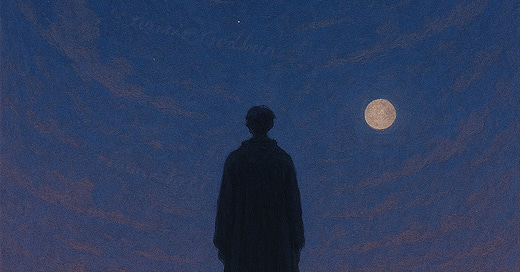The Two Lives Once Lived
Once, there was a life in full bloom—
a spirit dressed in colors,
dancing between cafés and city lights,
finding joy in mirrored reflections,
in familiar faces, festive halls, and photographs that smiled back.
The world was wide, and the heart was loud.
Laughter came easily,
and the measure of a good day
was how much was done,
how far one had moved,
how brightly one had been seen.
There were hands to hold, voices to reply,
conversations that filled rooms like music.
To be loved was to be noticed.
To be someone meant to be known.
Success had shape and name—
titles, calendars, applause,
a mountain that never quite ended,
but always promised more.
“He who has a why to live can bear almost any how.”
— Friedrich Nietzsche
Faith too, was a structure—
recitations, duties, sacred timings,
a way to bargain with heaven
in hopes of rain.
Even pain had to be dressed quickly—
hidden under smiles, swallowed in silence,
as if sorrow were an error,
not a teacher.
“Your pain is the breaking of the shell that encloses your understanding.”
— Khalil Gibran
But something shifted—
slowly, gently, like a tide leaving shore.
Not a fall, not a crisis—
just a soft undoing.
What once thrilled the nerves
now passed through like wind.
The cities grew quieter,
not because they changed—
but because something inside did.
“You do not need to leave your room. Remain sitting at your table and listen.
Do not even listen, simply wait. The world will freely offer itself to you.”
— Franz Kafka
And so began a second life—
not built, but found.
Words became fewer,
but truer.
Love no longer needed stage or spotlight.
It whispered, and that was enough.
Friends became fewer too,
but the silences between them
began to feel like sacred ground.
The ladder disappeared.
There was no more “up.”
Only in.
“Nowhere can man find a quieter or more untroubled retreat than in his own soul.”
— Marcus Aurelius
Faith became breath.
The Divine no longer distant—
but diffused in every stillness.
The sacred, now encountered
in falling leaves,
in burning tea,
in one’s own returning gaze.
“The eye through which I see God is the same eye through which God sees me.”
— Meister Eckhart
Tears were no longer failures.
They were baptisms.
Pain, no longer an enemy—
but a sculptor carving depth
into the stone of being.
“The function of prayer is not to influence God,
but rather to change the nature of the one who prays.”
— Søren Kierkegaard
Meaning stopped arriving as thunder.
It became dew—
soft, unnoticed,
but enough to nourish.
“In the midst of winter, I found there was, within me, an invincible summer.”
— Albert Camus
And the need to be someone
slowly unraveled
into the grace of simply being.
“Don’t grieve. Anything you lose comes round in another form.”
— Rumi
Some called it change.
Perhaps it is.
But those who walk this path
know it was never change—
only return.
Return to what was always waiting
beneath the noise:
A life not lived with the world,
but a life lived within the soul.



